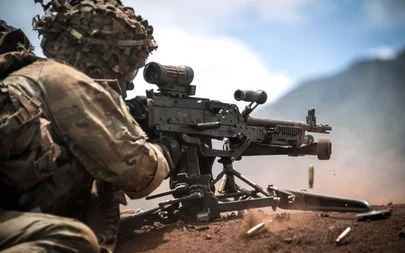Ukrainian officials have confirmed that their forces are on the offensive in the Bakhmut region…reports Asian Lite News
Kyiv’s counteroffensive against Russian forces has started, a Washington, DC-based think tank monitoring the war in Ukraine has said, though Ukrainian officials continue to deny or decline confirmation that their long-awaited campaign to retake territory occupied by Russian forces is under way.
“The Ukrainian #counteroffensive has begun. Activity throughout #Ukraine is consistent with a variety of indicators that Ukrainian counteroffensive operations are underway across the theater,” the Institute for the Study of War (ISW) said in a series of tweets late on Thursday.
Ukrainian officials have confirmed that their forces are on the offensive in the Bakhmut region – where they have reportedly gained territory – and the ISW said that it had “observed a general uptick in military activity across the entire front line, not all of it part of the Ukrainian counter-offensive effort”.
The ISW said the counteroffensive “won’t likely unfold as a single grand operation”. “It will likely consist of many undertakings at numerous locations of varying size and intensity over many weeks.”
With Ukrainian officials signalling that the start of the counteroffensive will not be officially announced, other experts have also concluded that the campaign has begun amid reports of fighting intensifying in areas along the more-than-1,000-kilometer (620-mile) front line from Kherson on the Black Sea to Ukraine’s border with Russia.
NBC News, citing a senior officer and a soldier near the front lines, also said the offensive had started, while The Washington Post, citing “four individuals” in the armed forces, reported the same information on Thursday.
Asked about those reports, a spokesperson for the General Staff of the Armed Forces of Ukraine told the Reuters news agency: “We have no such information.”
In his nightly address on Thursday, Ukrainian President Volodymyr Zelenskyy hailed what he described as “results” in heavy fighting in the Donetsk region in eastern Ukraine.
“I am in constant communication with our military. The commanders of Khortytsia, Tavria, [and] all those involved in the hottest areas. Donetsk region – very tough battles,” he said.
“But there is a result, and I am grateful to everyone who ensures this result! Bakhmut – well done. Step by step. I thank each of our warriors!”
Zelenskyy referenced other battlefield areas but said that now was not the time to discuss them.
“The entire east, the situation in the south, the situation after the Russians blew up the dam of the native Kakhovka – we see every detail. But it’s not time to talk about it today.”
In a podcast on Wednesday, Michael Kofman of the Center for Naval Analyses, a US research group, said fighting had taken a “more qualitative turn” with Ukrainian forces appearing to mount offensive operations near the eastern town of Velyka Novosilka and other points in the southern part of the Donetsk region, as well as on its border with the Zaporizhia region.
“These attacks, I don’t believe [them] to be the main offensive effort, but they mark what I think is the beginning of the Ukrainian offensive,” he said.
Russia said its forces had fought a two-hour battle with Ukrainian troops in the early hours of Thursday in the Zaporizhia region.
Russian Defence Minister Sergei Shoigu said the Ukrainian offensive involved 1,500 soldiers and 150 armoured vehicles. “The enemy was stopped and retreated after heavy losses,” he said.
Ukrainian Deputy Defence Minister Hanna Maliar said only that Russia was conducting “defensive actions” near the town of Orikhiv in the Zaporizhia region.
According to the ISW, the initial phase of Ukraine’s counteroffensive operations will likely be the most costly and difficult in terms of lives lost and equipment destroyed as troops and armour attempt to penetrate Russia’s defensive positions.
“Militaries have long identified the penetration phase of a mechanised offensive as the most dangerous and costly. The success or failure of this phase may not be apparent for some time,” the ISW said.

Leave a Reply